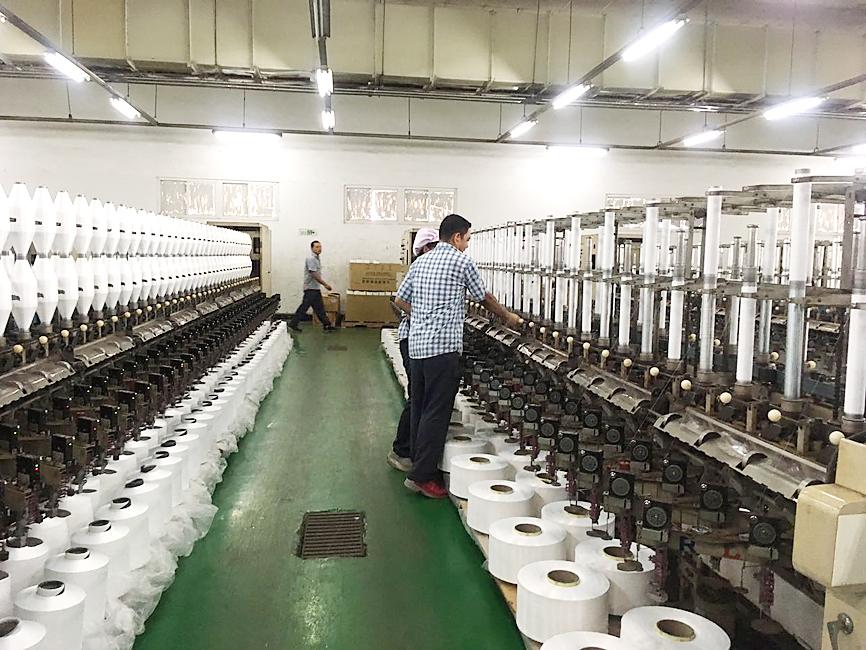The climate gauge for the nation’s manufacturing sector in September remained “yellow-red” for the fifth consecutive month, reflecting fast growth, even though port congestion and supply chain disruptions posed uncertainty and drove up operational costs, the Taiwan Institute of Economic Research (TIER, 台經院) said yesterday.
The composite index for the manufacturing sector fell 0.21 points to 16.27 from August, as power rationing and emission restrictions in China slightly weighed on input activity, but the index remained just inside the “yellow-red” range of 16 to 18.5 points, the Taipei-based institute said.
EVERGRANDE WOES

Photo: Chen Rou-chen, Taipei Times
While cash woes plaguing Chinese property developer China Evergrande Group (恆大集團) also dampened sentiment, share prices of electronics, machinery equipment and telecommunication companies picked up, lending support to the overall score, it said.
The institute uses a five-color system to gauge manufacturing activity, with “blue” suggesting recession, “yellow-blue” a slowdown, “green” stability, “yellow-red” fast growth and “red” overheating.
It was the seventh month this year that the manufacturing sector reported a yellow-red reading, the institute said.
Among the five components in the composite index, the sub-index on the operating environment gained 0.38 points, while selling prices were flat, as the peak season might be over for some sectors with correction pressure building, it said.
The input measure lost 0.29 points and the cost tracker shed 0.01 points, it added.
The reading for industries supplying essential goods, such as textile products, was yellow-red, although lockdowns in Vietnam caused supply chain disruptions, it found.
Most Taiwanese textile companies operate manufacturing facilities in Vietnam to save on production costs.
Strong exports pushed up demand for cardboard boxes, causing their prices to increase, the institute said.
The measure also turned yellow-red for manufacturers of petrochemical and plastic products, supported by soaring crude and oil product prices, it said.
However, container shortages and port bottlenecks abroad have delayed their input schedule, it added.
Base metal suppliers reported double-digit percentage growth in business as they continued to benefit from increasing infrastructure spending in the US and Europe, the institute said, adding that machinery equipment vendors were less impressive, reporting steady sales.
Business at electronic component providers remained robust on the back of new product launches and insatiable demand for 5G technology and Internet of Things applications, the institute said.
PENT-UP DEMAND
Auto parts suppliers reported price hikes amid pent-up demand for vehicles, but port congestion and a global chip shortage stretched delivery times, causing the vehicle market in China to slow down, which has turned the reading for related sectors in Taiwan to yellow-blue, it said.

NEW IDENTITY: Known for its software, India has expanded into hardware, with its semiconductor industry growing from US$38bn in 2023 to US$45bn to US$50bn India on Saturday inaugurated its first semiconductor assembly and test facility, a milestone in the government’s push to reduce dependence on foreign chipmakers and stake a claim in a sector dominated by China. Indian Prime Minister Narendra Modi opened US firm Micron Technology Inc’s semiconductor assembly, test and packaging unit in his home state of Gujarat, hailing the “dawn of a new era” for India’s technology ambitions. “When young Indians look back in the future, they will see this decade as the turning point in our tech future,” Modi told the event, which was broadcast on his YouTube channel. The plant would convert

‘SEISMIC SHIFT’: The researcher forecast there would be about 1.1 billion mobile shipments this year, down from 1.26 billion the prior year and erasing years of gains The global smartphone market is expected to contract 12.9 percent this year due to the unprecedented memorychip shortage, marking “a crisis like no other,” researcher International Data Corp (IDC) said. The new forecast, a dramatic revision down from earlier estimates, gives the latest accounting of the ongoing memory crunch that is affecting every corner of the electronics industry. The demand for advanced memory to power artificial intelligence (AI) tasks has drained global supply until well into next year and jeopardizes the business model of many smartphone makers. IDC forecast about 1.1 billion mobile shipments this year, down from 1.26 billion the prior

People stand in a Pokemon store in Tokyo on Thursday. One of the world highest-grossing franchises is celebrated its 30th anniversary yesterday.

Zimbabwe’s ban on raw lithium exports is forcing Chinese miners to rethink their strategy, speeding up plans to process the metal locally instead of shipping it to China’s vast rechargeable battery industry. The country is Africa’s largest lithium producer and has one of the world’s largest reserves, according to the US Geological Survey (USGS). Zimbabwe already banned the export of lithium ore in 2022 and last year announced it would halt exports of lithium concentrates from January next year. However, on Wednesday it imposed the ban with immediate effect, leaving unclear what the lithium mining sector would do in the